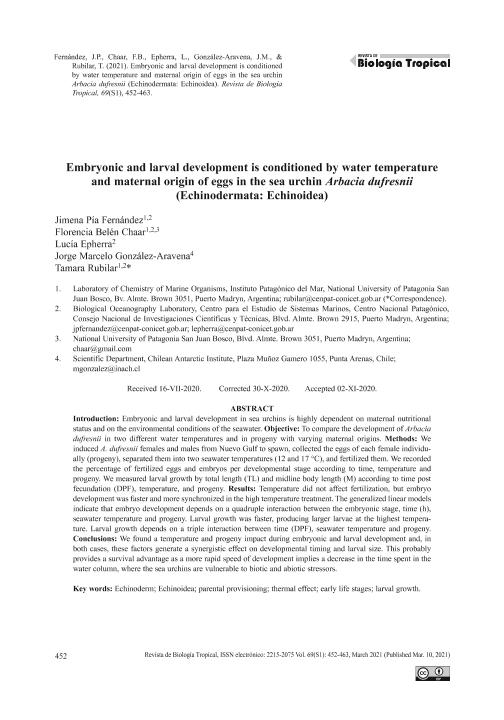Mostrar el registro sencillo del ítem
dc.contributor.author
Fernandez, Jimena Pía

dc.contributor.author
Chaar, Florencia Belén

dc.contributor.author
Epherra, Lucía

dc.contributor.author
Gonzalez Aravena, Jorge Marcelo

dc.contributor.author
Rubilar Panasiuk, Cynthia Tamara

dc.date.available
2022-07-29T12:55:38Z
dc.date.issued
2021-03
dc.identifier.citation
Fernandez, Jimena Pía; Chaar, Florencia Belén; Epherra, Lucía; Gonzalez Aravena, Jorge Marcelo; Rubilar Panasiuk, Cynthia Tamara; Embryonic and larval development is conditioned by water temperature and maternal origin of eggs in the sea urchin Arbacia dufresnii (Echinodermata: Echinoidea); Revista de Biología Tropical; Revista de Biología Tropical. International Journal of Tropical Biology and Conservation; 69; S1; 3-2021; 452-463
dc.identifier.uri
http://hdl.handle.net/11336/163492
dc.description.abstract
Introduction: Embryonic and larval development in sea urchins is highly dependent on maternal nutritionalstatus and on the environmental conditions of the seawater. Objective: To compare the development of Arbaciadufresnii in two different water temperatures and in progeny with varying maternal origins. Methods: Weinduced A. dufresnii females and males from Nuevo Gulf to spawn, collected the eggs of each female individually(progeny), separated them into two seawater temperatures (12 and 17 °C), and fertilized them. We recordedthe percentage of fertilized eggs and embryos per developmental stage according to time, temperature andprogeny. We measured larval growth by total length (TL) and midline body length (M) according to time postfecundation (DPF), temperature, and progeny. Results: Temperature did not affect fertilization, but embryodevelopment was faster and more synchronized in the high temperature treatment. The generalized linear modelsindicate that embryo development depends on a quadruple interaction between the embryonic stage, time (h),seawater temperature and progeny. Larval growth was faster, producing larger larvae at the highest temperature.Larval growth depends on a triple interaction between time (DPF), seawater temperature and progeny.Conclusions: We found a temperature and progeny impact during embryonic and larval development and, inboth cases, these factors generate a synergistic effect on developmental timing and larval size. This probablyprovides a survival advantage as a more rapid speed of development implies a decrease in the time spent in thewater column, where the sea urchins are vulnerable to biotic and abiotic stressors.
dc.format
application/pdf
dc.language.iso
eng
dc.publisher
Revista de Biología Tropical
dc.rights
info:eu-repo/semantics/openAccess
dc.rights.uri
https://creativecommons.org/licenses/by/2.5/ar/
dc.subject
ECHINODERM
dc.subject
ECHINOIDEA
dc.subject
PARENTAL PROVISIONING
dc.subject
THERMAL EFFECT
dc.subject
EARLY LIFE STAGES
dc.subject
LARVAL GROWTH
dc.subject.classification
Biología del Desarrollo

dc.subject.classification
Ciencias Biológicas

dc.subject.classification
CIENCIAS NATURALES Y EXACTAS

dc.title
Embryonic and larval development is conditioned by water temperature and maternal origin of eggs in the sea urchin Arbacia dufresnii (Echinodermata: Echinoidea)
dc.type
info:eu-repo/semantics/article
dc.type
info:ar-repo/semantics/artículo
dc.type
info:eu-repo/semantics/publishedVersion
dc.date.updated
2022-03-04T13:19:29Z
dc.identifier.eissn
2215-2075
dc.journal.volume
69
dc.journal.number
S1
dc.journal.pagination
452-463
dc.journal.pais
Costa Rica

dc.journal.ciudad
San José
dc.description.fil
Fil: Fernandez, Jimena Pía. Consejo Nacional de Investigaciones Científicas y Técnicas. Centro Científico Tecnológico Conicet - Centro Nacional Patagónico. Centro para el Estudio de Sistemas Marinos; Argentina. Universidad Nacional de la Patagonia "San Juan Bosco"; Argentina
dc.description.fil
Fil: Chaar, Florencia Belén. Consejo Nacional de Investigaciones Científicas y Técnicas. Centro Científico Tecnológico Conicet - Centro Nacional Patagónico. Centro para el Estudio de Sistemas Marinos; Argentina. Universidad Nacional de la Patagonia "San Juan Bosco"; Argentina
dc.description.fil
Fil: Epherra, Lucía. Consejo Nacional de Investigaciones Científicas y Técnicas. Centro Científico Tecnológico Conicet - Centro Nacional Patagónico. Centro para el Estudio de Sistemas Marinos; Argentina
dc.description.fil
Fil: Gonzalez Aravena, Jorge Marcelo. Instituto Antartico Chileno; Chile
dc.description.fil
Fil: Rubilar Panasiuk, Cynthia Tamara. Consejo Nacional de Investigaciones Científicas y Técnicas. Centro Científico Tecnológico Conicet - Centro Nacional Patagónico. Centro para el Estudio de Sistemas Marinos; Argentina. Universidad Nacional de la Patagonia "San Juan Bosco"; Argentina
dc.journal.title
Revista de Biología Tropical. International Journal of Tropical Biology and Conservation
dc.relation.alternativeid
info:eu-repo/semantics/altIdentifier/url/https://revistas.ucr.ac.cr/index.php/rbt/issue/archive
dc.relation.alternativeid
info:eu-repo/semantics/altIdentifier/doi/http://dx.doi.org/10.15517/RBT.V69ISUPPL.1.46384
Archivos asociados
